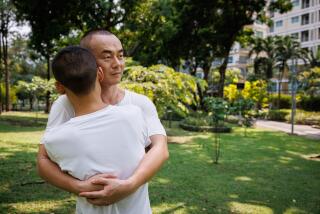RELIGION / JOHN DART : For Buddhists, Gay Marriage Is as Holy as Any Other Kind
- Share via
Gay and lesbian couples seeking a marriage-like ceremony to solemnize their commitment may find American-style Buddhism more responsive than most churches and synagogues, especially following a decision by the largest U.S. Buddhist organization to permit such religious rites.
Biblical admonitions against homosexuality have inhibited most Christian and Jewish clergy from conducting same-sex ceremonies--which hold religious significance for some couples even if they do not qualify as a legal marriage.
Buddhism, however, has no such baggage.
“Buddhism is not particularly uptight about sexuality,” said the Rev. Koren Baker, a gay priest at the Los Angeles Zen Center, which has run many retreats for gay, lesbian and bisexual Buddhists.
The head monk at the International Buddhist Meditation Center in Koreatown, who is lesbian herself, says she has performed about 10 same-sex ceremonies.
The practice may gain in popularity with the announcement by the large Soka Gakkai International-USA, based in Santa Monica, that its officials will allow same-sex weddings at their 64 community centers.
The Soka Gakkai decision to “support the couple in expressing their commitment” was briefly noted in May in the newspaper of the Soka Gakkai, a tightly disciplined, sometimes controversial Buddhist sect that claims 300,000 followers in this country.
Soka Gakkai, which is run by laymen and has been embroiled at times in political controversies in Japan, broke with its priests four years ago in a bitter dispute over religious authority.
[Affiliated with it is Soka University, which has campuses worldwide and has fought environmentalists for years over a proposed campus expansion in the Santa Monica Mountains in Calabasas. This week, the university announced the purchase of a second campus site in Orange County.]
Although its claim that it represents “true Buddhism” tends to irk other Buddhist groups, Soka Gakkai appeals to many American-born converts, including pop singer Tina Turner, as a path to prosperity and happiness.
In expanding the wedding policy to include gay and lesbian couples, U.S. General Director Fred Zaitsu told the organization’s newspaper: “I believe we have made great progress toward making our organization more humanistic.”
Al Albergate, a spokesman for the church headquarters, said Buddhism emphasizes equality and that “no doctrinal basis held us back from doing it.”
The decision was praised by the Rev. Sarika Dharma, head monk at the International Buddhist Meditation Center, a multiethnic organization unrelated to Soka Gakkai.
“It think it’s wonderful,” said the 57-year-old female monk, who grew up as Renee Richmond in Van Nuys and earned a master’s degree in speech communication at Cal State Northridge before training in the Vietnamese Zen monastic tradition.
“The Buddha said that all human beings have the capacity to become enlightened,” she said. “He didn’t say that if they were of a certain sexual orientation that they couldn’t. There is nothing in Buddhist doctrine to deny their acceptance.”
At the same time, the Rev. Sarika, as she is known, said Buddhist views on marriage and other social situations may vary according to the way in which followers in each country or culture adapt the 2,500-year-old meditative religion founded by Gautama Buddha.
In certain cultures, gay and lesbian activity is not acceptable, she said. Indeed, at the Wat Thai Temple in North Hollywood, a spokesman for the Thai immigrant congregation said that the subject of same-sex ceremonies has never come up.
“We do not have same-sex weddings in Thailand,” said the Venerable Sumanatissa Barua. “I don’t know if there would be opposition to it here; no one has talked about it.”
But in Buddhist centers where U.S.-born converts have been active, “we find a lot of them reaching out to provide special opportunities for gays and lesbians to come into a safe environment,” Sarika said.
“They don’t have to do anything to explain themselves.”
She is a member of the Lesbian and Gay Interfaith Clergy of Greater Los Angeles, which is watching legal developments in Hawaii, where the state’s Supreme Court ruled in 1993 that prohibiting gays and lesbians from marrying amounts to sex discrimination under the Hawaiian constitution. The case has been returned to a lower court and comes to trial again this fall.
If Hawaiian courts validate same-sex marriages, proponents and critics speculate that marriages in that state would have to be recognized in other states as well.
“We are concerned about a backlash from the Religious Right to pass specific laws in other states to deny the legality of those marriages,” said Sarika. However, she added, “our main concern is giving spiritual emphasis to the act.”
*
At the Los Angeles Zen Center, despite the openness to gay and lesbian practitioners, Baker said he has not performed any same-sex ceremonies. But in fact, the priest said, he has not performed any weddings in the 10 years he has been there.
In contrast to Western views that religion should provide ceremonies for many of life’s passages, Buddhism has not traditionally dealt with married relationships because they are seen as social constructs, said Richard K. Payne, dean of the Institute of Buddhist Studies in Berkeley.
“More attention is given to the care of the dead, for example, or with the meditative tradition and related practices,” said Payne, who is also associate professor of Japanese Buddhism at the institute.
“The fundamental issue for Buddhism here is whether anybody is harmed directly or indirectly by one’s actions.”
More to Read
Sign up for Essential California
The most important California stories and recommendations in your inbox every morning.
You may occasionally receive promotional content from the Los Angeles Times.












